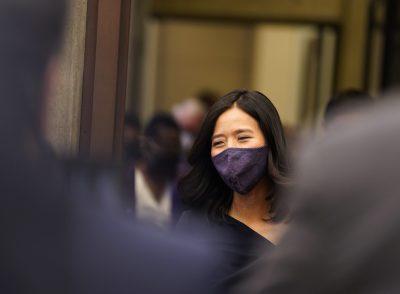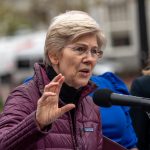
In Mayor Michelle Wu’s first bill signing, she divested City of Boston funds away from fossil fuel, tobacco and private prison industries via a Nov. 22 ordinance, according to a press release from the City of Boston.
The ordinance — which Wu sponsored when she was a councilor alongside Councilors Lydia Edwards and Matt O’Malley — will derive $65 million by 2025.
“This [climate crisis] is deeply personal for many of us and urgent,” Wu said at the signing. “We’re moving quickly to make sure that Boston will set the tone for what’s possible for that brightest, greenest future for our kids.”
The ordinance prohibits City investment in stocks, securities or other obligations of companies who derive over 15% of their funds from fossil fuels, tobacco or prison systems.
“We have talked about being greener, we’ve talked about being cleaner, but where our money was being invested didn’t line up with that,” Edwards said at the ordinance signing. “Today, the two are walking together.”
O’Malley and Wu initially filed a resolution for divestment in 2014 and presided over a council hearing on what fossil fuel divestment would look like for Boston’s economy.
Wu’s signing of the ordinance on her sixth day in office was an indicator she will be “a transformative leader” for Boston, O’Malley said at the signing.
“To now have a mayor who not only understands that and values that, but is going to lead with that, always looking through the lens of equity, of justice and environmentalism, this is a really big day for this city, and mark my words, other cities will follow suit,” O’Malley said.
Climate organizations in Boston, such as the Environmental League of Massachusetts and Massachusetts Sierra Club, said they were thrilled to have Mayor Wu’s first ordinance be about combating the climate crisis.
Maliha Khan, campaigns and fellowship manager for ELM, said the organization had been involved in Wu’s campaign and election because of her strong stance on climate change.
“This was a significant and historic step, already fulfilling key promises she made on the campaign trail,” Khan said. “This action honestly shows that our leaders are finally taking climate seriously and using their financial power to fight the climate crisis.”
The Massachusetts Sierra Club Boston lead organizer Michele Brooks shared the same sentiment regarding Wu’s first ordinance as a “strong message” for what her platform aims to accomplish.
“It’s an important first step,” Brooks said. “[The ordinance] sets the tone of what we’re expecting to be a very welcoming and collaborative relationship that advocates, like Sierra Club, can have with the Wu administration.”
Other initiatives, such as Wu’s request to eliminate the fares for bus lines 23, 28 and 29 for two years, would not only make Boston transportation more accessible, but could eliminate emissions from cars on the road, Khan said.
“This is really pushing the City of Boston forward,” Khan said. “I think we’re finally getting to a point now where Boston is leading, Boston is making a difference here.”




